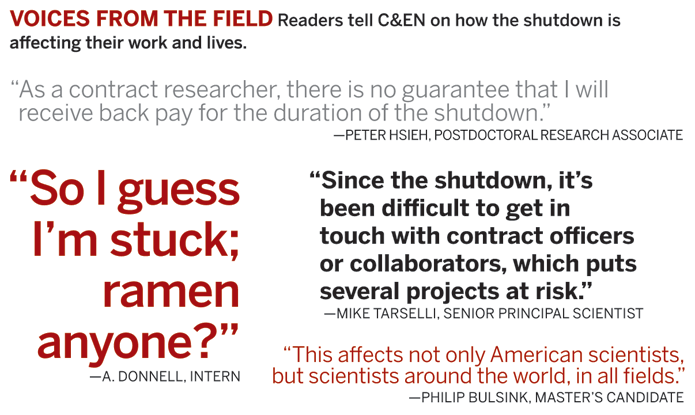Advertisement
Grab your lab coat. Let's get started
Welcome!
Welcome!
Create an account below to get 6 C&EN articles per month, receive newsletters and more - all free.
It seems this is your first time logging in online. Please enter the following information to continue.
As an ACS member you automatically get access to this site. All we need is few more details to create your reading experience.
Not you? Sign in with a different account.
Not you? Sign in with a different account.
ERROR 1
ERROR 1
ERROR 2
ERROR 2
ERROR 2
ERROR 2
ERROR 2
Password and Confirm password must match.
If you have an ACS member number, please enter it here so we can link this account to your membership. (optional)
ERROR 2
ACS values your privacy. By submitting your information, you are gaining access to C&EN and subscribing to our weekly newsletter. We use the information you provide to make your reading experience better, and we will never sell your data to third party members.
Safety
Shutdown Sidelines Chemical Plant Security Program
Counterterrorism: Review of security plans for chemical facilities is put on hold
by Glenn Hess
October 10, 2013
Chemical manufacturers are concerned about the future of the federal program for enhancing security at U.S. chemical facilities as the government shutdown nears the end of a second week.
Funding for the Department of Homeland Security’s (DHS) Chemical Facilities Anti-Terrorism Standards (CFATS) initiative expired on Oct. 4, and operations are suspended. Employees of the DHS division that runs the program remain on furlough.
“SOCMA members have reported that their CFATS authorization inspections, which were scheduled these last two weeks, are now postponed indefinitely,” says Elizabeth O’Neal, senior manager of government relations at the Society of Chemical Manufacturers & Affiliates, a trade group for the specialty chemical industry. “Progress on DHS’s review and approval of site security plans is important and is now halted,” she tells C&EN.
CFATS is a six-year-old program that requires companies that produce or use certain amounts of hazardous chemicals to conduct vulnerability assessments and develop and implement comprehensive security plans that meet standards established by DHS.
Industry representatives had also planned to participate in a meeting last week with officials from DHS, the Environmental Protection Agency, and the Occupational Health & Safety Administration to discuss ways to improve chemical safety after deadly explosions at the West, Texas, fertilizer depot in April (C&EN, April 22, page 8) and the Williams Olefins plant in Geismar, La., in June (C&EN, July 15, page 21). SOCMA has numerous recommendations to provide, O’Neal says. But that meeting, too, was postponed.
Lawmakers are also voicing concern over the inactive status of the chemical facility security program. “As we saw earlier this year with the tragic explosions at chemical facilities in Texas and Louisiana, it’s important that we make sure that chemicals are being produced, distributed, and stored in a manner that is both safe and secure,” says Sen. Thomas R. Carper (D-Del.), chairman of the Senate Homeland Security & Governmental Affairs Committee. “It’s hard to do that when we can’t do our job to fund the government.”
Rep. Bennie G. Thompson of Mississippi, the top Democrat on the House of Representatives Homeland Security Committee, says it is “unconscionable that CFATS as a program is effectively dead—it has no funding or authorization.”
Congress has yet to permanently authorize the chemical security program, so the failure to pass a spending bill means the initiative not only lacks funds but also the legal authority to operate. Funding and authorization for CFATS will have to be included in a continuing resolution to get the program back up and running.
To read about how the shutdown and eventual restart is affecting chemists, visit http://cenm.ag/woes. To contribute your story, visit http://cenm.ag/govt.



Join the conversation
Contact the reporter
Submit a Letter to the Editor for publication
Engage with us on Twitter